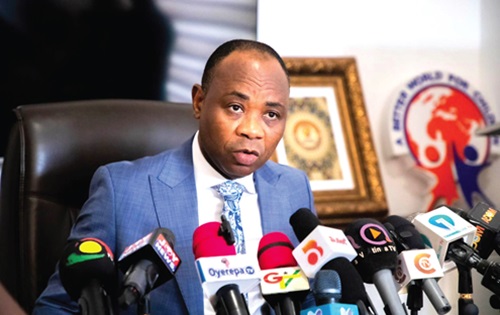The Ghana Immigration Service (GIS) has come under scrutiny for the manner in which it evacuated some migrant beggars from the streets of Accra in a recent operation aimed at clamping down on any clandestine activities they might be involved in.
In a swift reaction, the Commission on Human Rights and Administrative Justice (CHRAJ) and a non-governmental organisation (NGO), Child Rights International (CRI), have questioned the approach, which it believed risked violating both local and international laws.
Although both entities commended the GIS for its efforts in trying to address the menacing situation on the streets of the capital, they cited possible violations of human rights since the nation’s human rights obligations extended to undocumented migrants.
However, the GIS has justified the removal of foreign street beggars, emphasising that its actions were in line with standard operating procedures, international best practices, human rights and national security objectives.
It further stressed that the process was being handled humanely, professionally and lawfully.
CHRAJ position
In a statement signed by the Commissioner of CHRAJ, Dr Joseph Whittal, the commission said the operation created an unfavourable image for the country while putting the migrants in an extremely vulnerable and dehumanising conditions.
He, therefore, emphasised that the county’s actions must align with both domestic and international human rights obligations.
“It is, however, important to emphasise that under Chapter 5 of the 1992 Constitution, as well as ratified international human rights instruments, including International Convention on the Protection of the Rights of All Migrant Workers and Members of their families and the ECOWAS Free Movement Protocol, Ghana's human rights obligations also extend to these undocumented migrants,” the statement read.
It added that the repatriations needed to be conducted humanely, with dignity, and on a case-by-case basis to avoid violating the principle of non-refoulement, which prohibited returning individuals to places where they might face harm or persecution.
CHRAJ also underscored the need for gender-sensitive approaches that prioritised the welfare of women and children in line with constitutional protections and international conventions.
“The Commission proposes that a more sustainable intervention through interstate cooperation between Ghana and relevant states be strengthened to effectively address any migration related issues going forward,” it added.
Child Rights
CRI, on the other hand, raised red flags about the impact of the operation on children who comprised more than 60 per cent of the victims.
Speaking at a press conference in Accra yesterday, the Executive Director of CRI, Bright Appiah, said although the removal of children from the streets was long overdue, the state's current methods -- as led by immigration officials -- failed to account for the care and protection needs of the vulnerable children involved.
“Once you get Ghana Immigration Service, then the intention is that they are getting rid of these children because they feel that they have breached the immigration law. And that is where we also come in.
We think that the issue at stake goes beyond breach of immigration law. It's also a social protection matter," Mr Appiah emphasised.
Furthermore, the child-focused NGO said GIS’ approach to handling the situation indicated that children had been declared “illegal immigrants” or “prohibited immigrants” which was in gross violation of the country’s legislations.
“So you cannot say that they are in the company of their parents, so you give them the treatment as you give to their parents. You need to give them special treatment,” Mr Appiah added.
The organisation recommended the comprehensive collection of bio-data and thorough case assessments to properly identify, track and support individuals, especially children.
It also called for the documentation of specific needs, the establishment of clear care and repatriation protocols in line with Article 11 of the UNCRC, and stronger border monitoring systems.
They also urged the government to form or strengthen bilateral agreements with their countries of origin to ensure safe, legal and dignified return.
“These steps are critical not only for ensuring due process but also for preventing future re-entry or re-victimisation. Failure to follow such protocols risks pushing these children further into the margins of society, leaving them unprotected and vulnerable,” he said.
Diplomatic impact
Commenting on the issue, a Senior Research Fellow at the Legon Centre for International Affairs and Diplomacy (LECIAD), Dr Daniel Kipo-Sunyehzi, said the removal of migrants must be handled with extreme caution due to its potential diplomatic repercussions.
He explained that many of the street dwellers were nationals of ECOWAS member states such as Mali, Burkina Faso, Togo, Nigeria and Benin, who enjoyed the ECOWAS protocol on free movement of persons just like Ghanaians in these countries.
He warned that unilateral removals, if seen as harsh or discriminatory, could trigger reprisals against Ghanaians living or working undocumented in those states.
To avoid misinterpretation and protect Ghana’s international image, especially given the historical sensitivity surrounding the 1969 Aliens Compliance Order, Dr Kipo-Sunyehzi advised the government to engage the embassies of the affected countries, clearly communicate the intentions behind the exercise, and allow diplomatic representatives to observe and verify that the operations were carried out humanely and lawfully.
He emphasised that this diplomatic collaboration would ensure the process was transparent, respectful and aligned with both domestic and international obligations.

